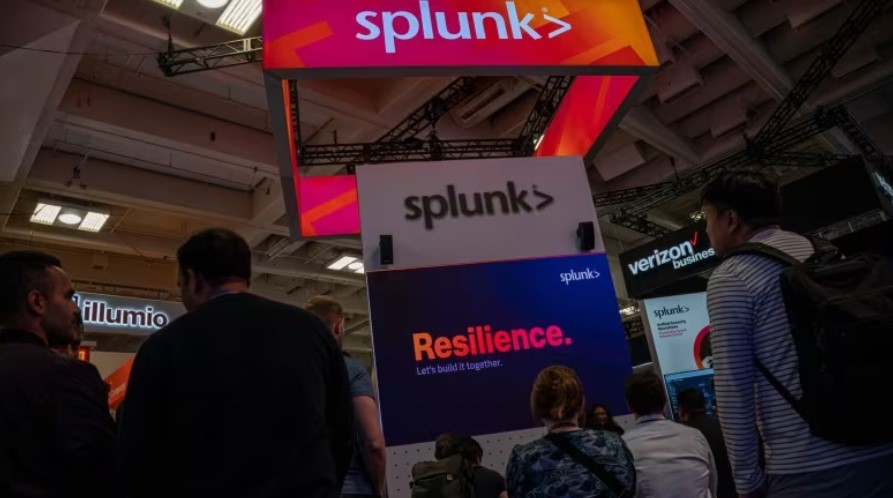Cisco is acquiring cybersecurity software firm Splunk in an all-cash transaction valued at approximately $28 billion, equivalent to $157 per share, as announced by the company on Thursday. This acquisition represents one of Cisco’s most significant deals and marks a continuation of their strategy to expand their cybersecurity portfolio. As a result of this announcement, Splunk’s stock saw a 21% increase in Thursday morning trading, while Cisco’s shares experienced a 3.3% decline.
After the deal is finalized, Gary Steele, the CEO of Splunk, will become a member of Cisco’s executive leadership team and will report directly to Chuck Robbins, the CEO of Cisco.
Cisco anticipates that the acquisition will generate positive cash flow and improve gross margins within the initial year after its completion. Furthermore, it is expected to enhance Cisco’s non-GAAP earnings per share by the second year. Chuck Robbins, speaking on CNBC’s Squawk on the Street on Thursday, expressed his belief that organizational synergies would start to manifest and make a substantial impact within 12 to 18 months.
Splunk, established in 2003, develops software utilized by organizations’ IT and security departments to monitor and analyze data. Cisco specializes in selling network infrastructure, including routers and switches, alongside providing security services and software solutions.”
“With hyper connectivity, AI and increasing cyber threats, the value of data only increases, and that’s why this deal makes sense,” Cisco’s Chuck Robbins told analysts on a conference call.
The companies anticipate the transaction to be finalized within a timeframe of nine to 12 months, pending the mandatory regulatory review. They have minimized concerns about potential obstacles to completing the deal and have explicitly stated that the merger will not require approval from the Chinese government.
Cisco plans to fund the acquisition using a mix of cash and debt, as stated by Robbins. During a conference call with analysts, he remarked, “Together, we will become one of the largest software companies globally.”
In fiscal year 2023, Cisco disclosed approximately $20 billion in cash flow generated from its operations and possessed a cash reserve exceeding $26 billion. Prior to the acquisition, Cisco boasted a market capitalization of roughly $225 billion, while Splunk’s market capitalization stood at approximately $20 billion.
The Wall Street Journal reported last year that Cisco had made a previous attempt to acquire Splunk for over $20 billion. Cisco has been progressively emphasizing its software business. This acquisition surpasses Cisco’s earlier notable deals, including the approximately $7 billion acquisition of Scientific Atlanta in 2005 and the nearly $5 billion purchase of Acacia Communications Inc. in 2021.
“Cisco’s acquisition is aimed at enhancing its capacity to extract valuable insights from its extensive customer data repository, as Chuck Robbins explained in a blog post on the company’s website. He also noted that generative AI is reshaping various industries, and Cisco is uniquely positioned to assist its clients in developing new tools for data analysis.
In a client note, Wedbush analyst Daniel Ives remarked, ‘We consider this acquisition to represent a reasonable valuation for this strategic asset, particularly at a time when investors are closely monitoring potential targets.’ He expressed confidence that the timing of the deal was opportune and suggested that it would help prevent competitors like Microsoft, Google, Oracle, Amazon, Adobe, IBM, and others from dominating the emerging AI-driven software and cybersecurity landscape. He also stated that there were no foreseen competing bids or regulatory obstacles in the way of the deal.
If Cisco withdraws from the agreement or is compelled to do so due to regulatory actions, it will be obligated to pay Splunk a termination fee of $1.48 billion, as outlined in a regulatory filing. Conversely, if Splunk decides to terminate the deal for any cause, it will be responsible for a $1 billion breakup fee payable to Cisco.
In recent years, Cisco has shifted its focus away from its traditional business of network routers, switches, and other hardware. Software has grown to represent a more significant portion of the company’s revenue, leading Cisco to engage in a series of acquisitions of smaller companies to fuel its growth.
During the year 2023, Cisco has completed the acquisition of four companies: Armorblox, specializing in threat detection; Oort, focused on identity management; and Valtix and Lightspin, both operating in the cloud security sector.
Several major technology giants, including Microsoft, Amazon, Google, and Meta Platforms, are actively expanding their generative AI offerings, driven in part by the heightened public interest in the field following the release of ChatGPT by OpenAI. Throughout this year, various consumer-oriented companies and enterprises have announced their experiments with generative AI to assess its applicability within their respective industries and its potential to enhance products and increase efficiency.
Cisco is not the sole established technology company pursuing substantial growth through a significant acquisition. Microsoft Corporation, for instance, reached an agreement last year to acquire video game maker Activision Blizzard Inc. for approximately $75 billion, marking its largest acquisition to date. While this deal has encountered regulatory hurdles necessitating certain concessions from Microsoft, it is widely expected to be finalized.
Cisco received advisory services from Tidal Partners, Simpson Thacher, and Cravath, Swaine & Moore. Splunk received advisory services from Qatalyst Partners, Morgan Stanley, and Skadden, Arps, Slate, Meagher & Flom.
(Source: Rohan Goswami | CNBC | Will Feuer | Thomas Gryta | WSJ)









